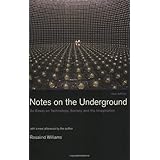
Average Reviews:

(More customer reviews)I tried to find a simple and concise description of what the book is about, but I cannot better Rosalind Williams own description at the start of Chapter One. "What are the consequences when human beings dwell in an environment that is predominantly built rather than given? This book seeks to answer that question. It explores the psychological, social and political implications of living in a technological world".
Rosalind Williams has delivered an insightful and extremely readable book. This book could easily have been a dry academic text that did little more than bring together a huge set of disconnected references from the last 150+ years. Instead of this, the author has contructed an engaging narrative that does justice to the extensive research and insightful analysis which flows through the book.
A must for anyone interested in technology and its impact of society and the individual.
Click Here to see more reviews about: Notes on the Underground: An Essay on Technology, Society, and the Imagination
With a new afterword by the author The underground has always played a prominent role in human imaginings, both as a place of refuge and as a source of fear. The late nineteenth century saw a new fascination with the underground as Western societies tried to cope with the pervasive changes of a new social and technological order. In Notes on the Underground, Rosalind Williams takes us inside that critical historical moment, giving equal coverage to actual and imaginary undergrounds. She looks at the real-life invasions of the underground that occurred as modern urban infrastructures of sewers and subways were laid, and at the simultaneous archaeological excavations that were unearthing both human history and the planet's deep past. She also examines the subterranean stories of Verne, Wells, Forster, Hugo, Bulwer-Lytton, and other writers who proposed alternative visions of the coming technological civilization. Williams argues that these imagined and real underground environments provide models of human life in a world dominated by human presence and offer a prophetic look at today's technology-dominated society.In a new afterword written for this edition, Williams points out that her book traces the emergence in the nineteenth century of what we would now call an environmental consciousness--an awareness that there will be consequences when humans live in a sealed, finite environment. Today we are more aware than ever of our limited biosphere and how vulnerable it is. Notes on the Underground, now even more than when it first appeared, offers a guide to the human, cultural, and technical consequences of what Williams calls "the human empire on earth."

0 comments:
Post a Comment